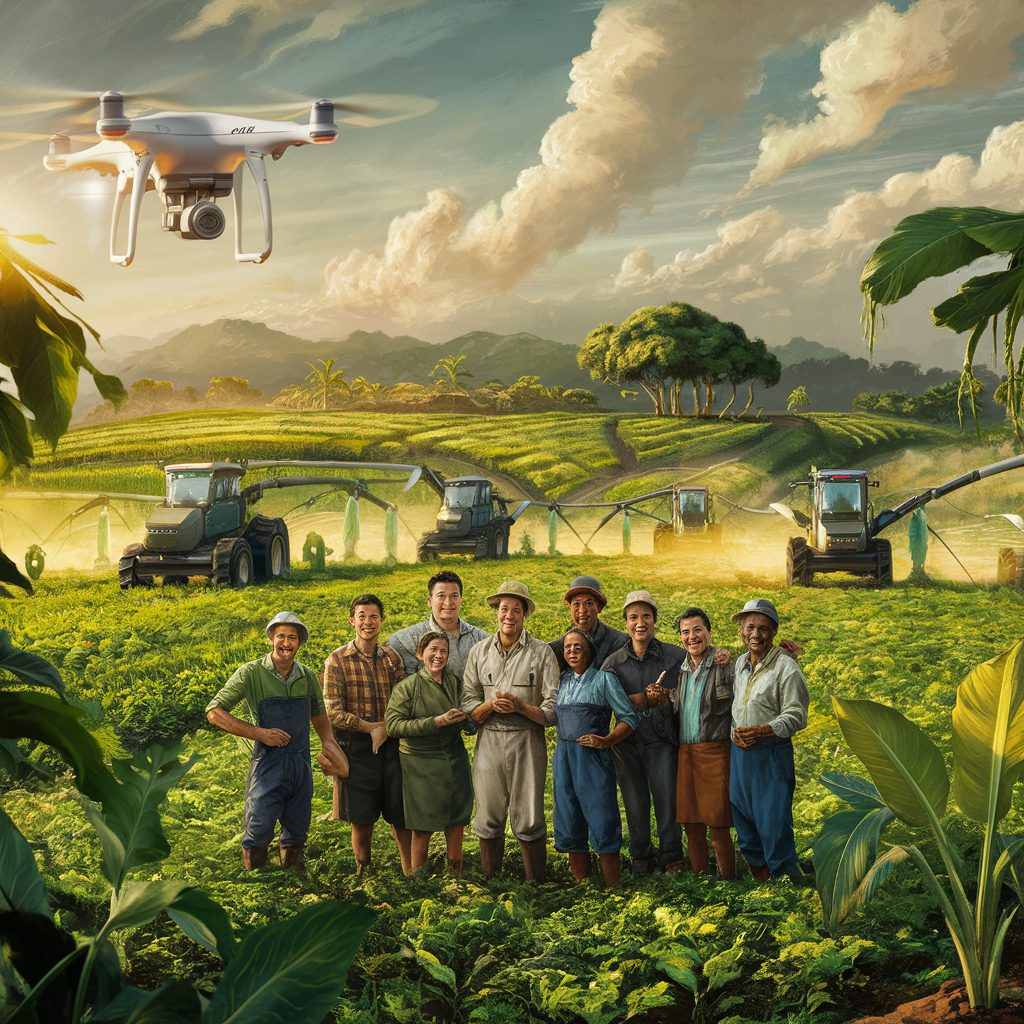In the fertile fields of innovation, The Seeds of Change: AI’s Role is sowing the seeds of a revolution in agriculture. This article delves into the real-world applications of AI that are transforming the agricultural landscape, enhancing productivity, and paving the way for a sustainable future.
AI: The New Farmer’s Almanac Gone are the days when farmers relied solely on the Farmer’s Almanac for predictions. Today, AI-driven predictive analytics offer precise weather forecasts, soil health assessments, and crop yield predictions. Companies like aWhere provide farmers with actionable insights, enabling them to make informed decisions about planting and harvesting.
In an era marked by rapid population growth and climate change, the global agricultural sector faces unprecedented challenges. With the demand for food expected to soar in the coming decades, farmers are under pressure to increase productivity while minimising environmental impact. Fortunately, Artificial Intelligence (AI) is emerging as a transformative force in agriculture, offering innovative solutions to enhance efficiency, optimise resource use, and promote sustainability. This article explores the real-world applications of AI in agriculture, highlighting its potential to revolutionise farming practices and secure the future of food production.
The AI-Powered Green Thumb Computer vision and machine learning are giving rise to an AI-powered green thumb. Technologies like Taranis utilise AI-driven aerial imagery to detect early signs of plant disease, nutrient deficiencies, and pest infestations, allowing farmers to take preemptive action to protect their crops.Robots: The Tireless Field Hands AI-driven robots are becoming the tireless field hands of agriculture. From automated weed control by Blue River Technology’s See & Spray robots to AI-enhanced livestock monitoring systems like Connecterra’s Ida, these innovations are reducing labour costs and improving farm productivity in The Seeds of Change: AI’s Role.
Precision Agriculture: Targeted Solutions for Enhanced Efficiency At the heart of AI’s impact on agriculture lies precision agriculture, a data-driven approach that leverages AI technologies to optimise farming practices. Through the integration of sensors, drones, and satellite imagery, farmers can collect vast amounts of data on soil composition, crop health, and weather patterns. AI algorithms analyse this data to generate actionable insights, enabling farmers to make informed decisions regarding planting, irrigation, fertilisation, and pest control. By precisely targeting inputs based on real-time data, precision agriculture maximises yields while minimising waste, leading to more sustainable farming practices.
Predictive Analytics for Weather and Pest Management Weather variability and pest outbreaks pose significant challenges to agricultural productivity. AI-based predictive analytics models analyse historical weather data, satellite imagery, and pest population dynamics to forecast future conditions and identify potential risks. By predicting weather patterns and pest infestations with greater accuracy, farmers can implement preemptive strategies, such as crop diversification, pest-resistant crop varieties, or early pest detection systems, to minimise losses and ensure crop resilience in the face of environmental threats.
Smart Irrigation and Water Management Water scarcity is a critical issue confronting agriculture, particularly in regions prone to drought or water stress. AI-driven smart irrigation systems optimise water use by monitoring soil moisture levels, weather forecasts, and crop water requirements in real-time. By dynamically adjusting irrigation schedules and delivery rates based on environmental conditions and plant needs, these systems reduce water waste, improve water efficiency, and conserve precious resources. Moreover, AI algorithms can analyse data from sensors and satellite imagery to identify areas with excessive water usage or leaks, enabling farmers to address inefficiencies and enhance overall water management practices.
Challenges and Opportunities – Despite the promising potential of AI in agriculture, several challenges remain to be addressed. These include access to technology and digital literacy among farmers, data privacy and security concerns, as well as ethical considerations surrounding the use of AI in farming practices. Moreover, the scalability and affordability of AI solutions must be ensured to benefit smallholder farmers and rural communities, particularly in developing countries.
AI is revolutionising agriculture by enabling data-driven decision-making, enhancing productivity, and promoting sustainability across the agricultural value chain. From precision farming and crop monitoring to weather forecasting and supply chain optimisation, AI technologies offer innovative solutions to address the complex challenges facing the agricultural sector. By harnessing the power of AI responsibly and collaboratively, we can build a more resilient, efficient, and sustainable food system to feed a growing global population while safeguarding the planet for future generations.


Somebody essentially lend a hand to make significantly posts I might state That is the very first time I frequented your web page and up to now I surprised with the research you made to create this particular put up amazing Excellent job